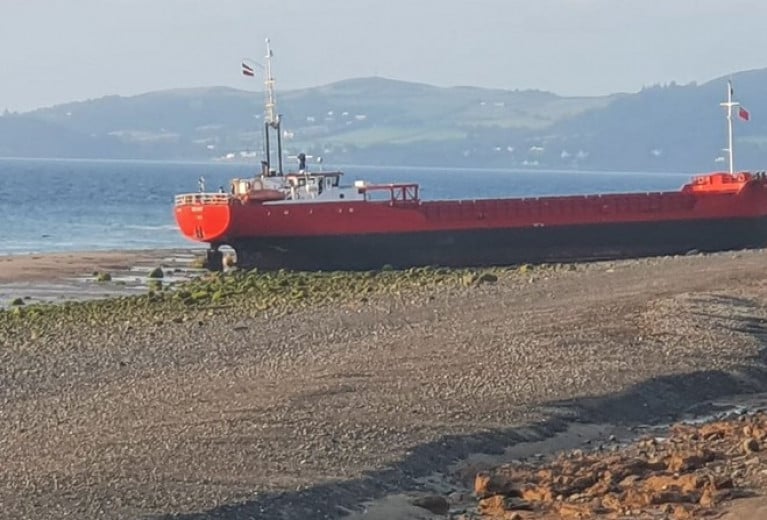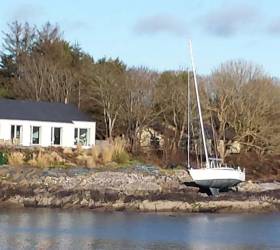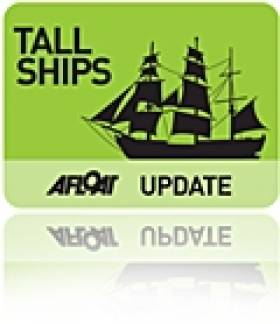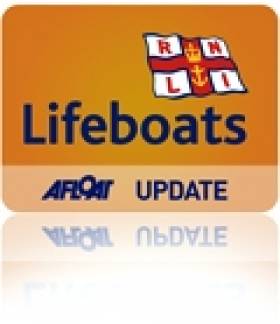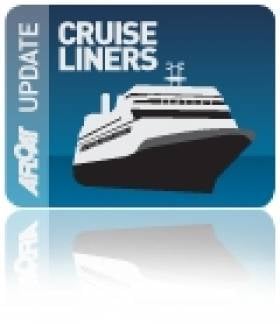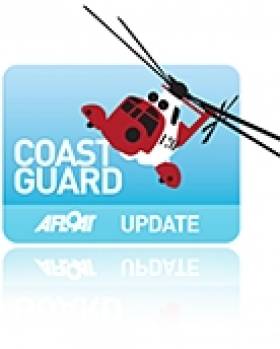Displaying items by tag: Aground
Cargo Ship that Ran Aground on Manx Coast Is Successfully Refloated
On the Manx coast a cargo ship which had ran aground along the island's northern coast has been successfully refloated.
The Ceg Orbit, according to Manx Radio, was on a passage in the Irish Sea from Liverpool to Belfast with 1,200 tons of wheat, when it went ran aground at Cranstal during the early hours of Thursday morning.
In what was the second attempt to free the vessel, the Laxey Towing Company tug Wendy Ann assisted by the Liverpool tug CT Vector successfully freed the coaster during high-tide overnight.
The coaster was towed into Douglas Harbour's South Quay this morning where diving teams will survey for any damage caused by the grounding.
Attempt to Refloat West Cork Yacht This Morning
Attempts to recover a 32–foot that went aground in Schul, West Cork during Storm Ophelia get underway this morning.
A recovery team is expected to slide the yacht down the rocks and back into the water using inflated rubber bags.
Astrid Repairs Unlikely As Experts Discuss Salvage Plans
#Astrid - The Irish Times reports that marine salvage experts met on Friday with insurers of the Dutch tall ship Astrid to determine a wreck removal plan for the sunken vessel.
The sail training ship, which was taking part in The Gathering Cruise around Ireland, capsized after hitting rocks inside the Sovereign Islands near Kinsale in Co Cork on the afternoon of Wednesday 24 July.
All 30 crew on board - including a number of teenage sail trainees - were brought to safety by RNLI lifeboats from Kinsale and Courtmacsherry in a major rescue operation.
As previously reported on Afloat.ie, investigations got under way last Thursday 25 July to determine what caused the 42-metre brig to run aground at the mouth of Oysterhaven harbour.
Despite strong winds and rough seas at the time of her foundering, the Astrid remains largely intact apart from rips along the hull.
And according to expert salvage diver Colm Harrington, the 95-year-old ship will be salvageable - using slings to lift the vessel from the water.
However, the severity of the damage sustained means that it's unlikely the Astrid will be restored to her former glory.
The Irish Times has much more on the story HERE.
Skerries RNLI Assists Lone Sailor On Grounded Yacht
#RNLI - Skerries RNLI launched shortly before 7pm yesterday evening (Thursday 27 June) to assist an 11m yacht with one person on board that had run aground north of Rush Harbour.
The Dublin branch of the Irish Coast Guard requested Skerries RNLI to launch after two members of the public, who had been out kayaking, reported that the yacht was in difficulty.
Weather conditions at the time were a force one to two wind with calm seas.
The lifeboat, helmed by Willie Boylan with crew members Conor Walsh, Karl Duff and Peter Kennedy on board, was on scene in less than 10 minutes. However, by that time the yacht was completely aground above the tide line.
Two volunteer crew members were put ashore to assess the casualty vessel. There was only one person on board and he was not in any immediate danger. There also appeared to be no significant damage to the hull of the boat.
The crew members laid out an anchor from the vessel to ensure that it did not drift onto the nearby rocks when it began to float again. Irish Coast Guard helicopter Rescue 116 was also on scene briefly to ensure that no assistance was required.
With the tide still falling, the decision was taken for the lifeboat to return later after the tide had turned to ensure that the yacht floated safely and to assist in helping it safely back to a harbour.
At 10.20pm the volunteer crew launched the lifeboat again to attend to the yacht, this time with Conor Walsh at the helm and Karl Duff, Eoin Grimes and Emma Wilson as crew, bringing a salvage pump with them.
One of the crew was put ashore to check on the casualty again and to secure a tow line to the boat. As the tide rose, the lifeboat kept the tension on the tow to prevent the yacht being pushed further on to the rocks.
At 11.45pm the yacht was refloated and guided back to Skerries Harbour with the lifeboat leading the way to help navigate around the islands safely in the dark.
Speaking after, Skerries RNLI lifeboat operations manager Niall McGrotty said: "There didn’t appear to be much damage and the conditions were calm. However, it was a large boat with a lot of equipment on board, so there were some concerns around whether it would refloat successfully. Thankfully, it did and everyone made it home safe and sound."
Body of Final Tit Bonhomme Crewmember Recovered
#NEWS UPDATE - The body of the last missing crewmember of the stricken Tit Bonhomme was recovered in Glandore Bay in West Cork on Friday, The Irish Times reports.
The remains of 23-year-old Egyptian national Saied Ali Edlin were discovered floating on the surface to the west of the bay off Long Point, almost a mile from the wreck site and close to a month after the tragedy occurred.
It also comes just two days after the body of skipper Michael Hayes was found close to the mouth of the harbour, as previously reported on Afloat.ie.
The fishing vessel Tit Bonhomme ran aground in rough seas near Adam's Rock, at the mouth of Glandore Harbour, on Sunday 15 January.
Five of the six-person crew - Eldin, Hayes, Attea Shaban (26), Kevin Kershaw (21) and Wael Mohammed (35) - lost their lives when the boat went down.
Only 43-year-old Abdul Mohammed, the brother of Wael Mohammed, survived the sinking after he was able to reach the shore.
"Some of those lost were Egyptian, some were Irish but if you fish the sea, you’re all part of the same family," commented harbour master John Minihane. "We’re all the same, we’re one fishing family and we brought them home.”
The Irish Times has more on the story HERE.
Cruise Lines Mandate Pre-Departure Safety Briefing for Passengers
#CRUISE LINERS - Cruise ship passengers will be given a safety briefing before leaving port under new industry rules drawn up in the wake of the Costa Concordia incident, The Guardian reports.
Three organisations representing international cruise lines have agreed that the 'muster drill' - which is currently conducted within 24 hours of setting sail as per maritime law - must now be held before departure from any port.
The move comes after reports that hundreds of passengers who had boarded the stricken vessel hours before it ran aground off the western Italian coast had not yet had any kind of safety instruction.
Muster drills, whereby passengers are shown how to put on lifejackets and directed to exits, are already common practice in the industry.
As previously reported on Afloat.ie, an Irish couple were among thousands rescued from the Costa Concordia after the incident on Friday 13 January. At least 32 people are believed to have died in the disaster, with 15 recorded passengers still missing.
The Guardian has more on the story HERE.
Body of Tit Bonhomme Skipper Recovered
#NEWS UPDATE - RTÉ News reports that a body found in Glandore Harbour today is that of Tit Bonhomme skipper Michael Hayes.
The body of the 52-year-old from Helvick Head in Co Waterford, who went missing more than three weeks ago, was discovered floating close to the mouth of the harbour around lunchtime by his brother, Garda Chief Spt Tom Hayes, according to The Irish Times.
As previously reported on Afloat.ie, the search operation in Glandore is being wound down this week after the remains of three of the five missing crew were recovered. Egyptian crewman Said Mohammed (23) - also known as Saied Ali Eldin - is still missing.
The fishing vessel Tit Bonhomme ran aground and went down in rough seas near Adam's Rock, at the mouth of Glandore Harbour, on Sunday 15 January.
Only one crewmember, 43-year-old Abdul Mohammed, is confirmed alive after he was able to reach the shore.
Search for Glandore Fishermen to be Wound Down
#NEWS UPDATE - The search for two fishermen still missing after their boat went down off West Cork nearly three weeks ago will be wound down next week, The Irish Times reports.
Search teams have been combing the area for any trace of Michael Hayes (35), skipper of the Tit Bonhomme, and crewman Said Mohammed (23) after the fishing vessel ran aground in rough seas near Adam's Rock, at the mouth of Glandore Harbour, on Sunday 15 January.
The bodies of Kevin Kershaw (21), Attia Shaban (26) and Wael Mohammed (35) were recovered in the days and weeks following the tragedy. Only one of the six-person crew - 43-year-old Abdul Mohammed – is confirmed to have survived.
As previously reported on Afloat.ie, last weekend saw more than 90 divers embark on an extensive search of the wreck site and the Glandore bay area, with hundreds more volunteers searching the coastline and on land.
Italian Coastguard to Deliver Keynote at Dublin Conference
#COASTGUARD - Representaives of Italy's coastguard will give an account of its handling of the Costa Concordia tragedy at an international conference in Dublin next month, The Irish Times reports.
The Italian coastguard has been invited to deliver the keynote address at Search and Rescue 2012, which is being hosted in Ireland for the first time.
It is expected that this address will include a detailed account of the sinking of the cruise liner Costa Concordia last month.
At least 17 people have died and 12 are still missing after the ship ran aground on the western Italian coast. One Irish couple were among the thousands rescued from the stricken vessel.
Meanwhile, attendees at the conference - which is being hosted in the year of Ireland's charing of the EU coastguard network - will also witness demonstrations of the Irish Coast Guard's rescue helicopter fleet at Weston Airport in Leixlip.
As previously reported on Afloat.ie, Irish Coast Guard director Chris Reynolds has been charged with preparing the grounds for a permanent secretariat to be run by EU coastguard officers.
Search Continues for Three Fishermen Still Missing in West Cork
#NEWS UPDATE - The search is set to resume again this morning for the three fishermen not yet recovered after their trawler sank off West Cork last Sunday.
Skipper Michael Hayes and Egyptian crewmen Saied Ali Eldin and Wael Mohammed have been missing since the fishing vessel Tit Bonhomme ran aground and went down in rough seas near Adam's Rock, at the mouth of Glandore Harbour.
Only one of the six-person crew, 43-year-old Abdul Mohammed, is confirmed alive after he was able to reach the shore immediately following the incident.
As previously reported on Afloat.ie, Garda divers retrieved the body of Attia Shaban (26) on Thursday morning, followed in the afternoon by that of Kevin Kershaw (21).
Yesterday the search was expanded to cover an 18-mile radius after a dive at the wreck site was unsuccessful, according to The Irish Times.
Divers from the Garda and Naval Service will continue to focus on the wreck today, helped by favourable weather conditions, while volunteers join in the wider search of the coastline.
It emerged on Friday that that boat's aluminium wheelhouse sheared off in the rough seas that followed for three days after it ran aground.
RTÉ News has video of the search operation in progress HERE.



























